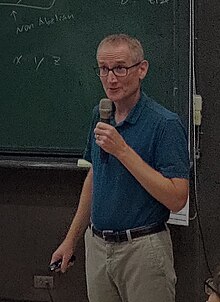
Summary
Duncan R. Lorimer (born 1969) is a British-born American astrophysicist. He is a professor of astronomy at West Virginia University, known for the discovery of the first fast radio burst in 2007.[1][2][3][4]
Duncan Lorimer | |
|---|---|
 | |
| Born | 1969 |
| Awards |
|
He received his PhD from the University of Manchester, and later held appointments at University of Manchester (Lecturer, 1994–1995); the Max-Planck-Institute for Radio Astronomy (Postdoctoral Fellow, 1995–1998); Cornell University (Postdoctoral Fellow, 1998–2001); University of Manchester (Royal Society Research Fellow, 2001–2006) and West Virginia University (Faculty, 2006–present).
Discovery of fast radio burst edit
The first fast radio burst was discovered in 2007 when Lorimer assigned his student David Narkevic at West Virginia University to look through archival data taken in 2001 by the Parkes radio dish in Australia.[5] Analysis of the survey data found a 30-jansky dispersed burst which occurred on July 24, 2001,[6] less than 5 milliseconds in duration, located 3° from the Small Magellanic Cloud. The burst became known as the Lorimer Burst or FRB 010724.[7]
In 2023, he was awarded the Shaw Prize in Astronomy.[8]
Family edit
Lorimer's wife Maura McLaughlin is also a professor at West Virginia University. They have three children.[9]
References edit
- ^ "A brief history: What we know so far about fast radio bursts across the universe". phys.org. Retrieved May 5, 2021.
- ^ "Burst of radio waves in Milky Way probably came from neutron star". The Guardian. November 4, 2020. Retrieved May 5, 2021.
- ^ "Let's ask the co-discoverer of the Fast Radio Burst, Duncan Lorimer". Center for Gravitational Waves and Cosmology. November 9, 2020. Retrieved May 5, 2021.
- ^ Woo, Marcus. "There are weird bursts of energy coming from deep space". BBC. Retrieved May 5, 2021.
- ^ McKee, Maggie (September 27, 2007). "Extragalactic radio burst puzzles astronomers". New Scientist. Retrieved September 18, 2015.
- ^ D. R. Lorimer; M. Bailes; M. A. McLaughlin; D. J. Narkevic; et al. (September 27, 2007). "A Bright Millisecond Radio Burst of Extragalactic Origin". Science. 318 (5851): 777–780. arXiv:0709.4301. Bibcode:2007Sci...318..777L. doi:10.1126/science.1147532. hdl:1959.3/42649. PMID 17901298. S2CID 15321890. Retrieved June 23, 2010.
- ^ Chiao, May (2013). "No flash in the pan". Nature Physics. 9 (8): 454. Bibcode:2013NatPh...9..454C. doi:10.1038/nphys2724.
- ^ Shaw Prize 2023
- ^ "WVU Astrophysicist Making Waves, Discovering New Pulsars". The Neuron. Winter 2011. [failed verification]


